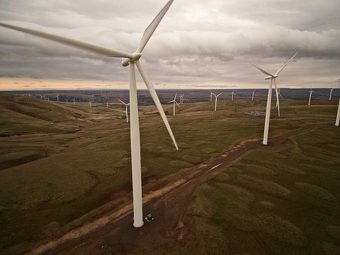
New EU renewables generation increased sharply in 2017, but the lion’s share of these gains were shouldered by the UK and Germany, demonstrating the “uneven” nature of energy sector decarbonisation across Europe.
That was the main conclusion of a new analysis by think tank Sandbag, which details how new wind, solar and biomass generation rose 12 per cent last year to overtake coal power generation for the first time across the EU.
The study said the performance underscored the “incredible progress” from five years’ ago when coal generation’s share of the power mix was twice that from the three main renewables technologies.
At the same time, however, renewables growth in the EU has become even more uneven, with the UK and Germany together contributing 56 per cent of clean power increases over the past three years.
Wind in particular has played a key role in the renewables’ upsurge, achieving a 19 per cent increase in electricity generation due to good wind conditions and “significant” investment in wind farms, the think tank explained. But despite its rapidly declining costs, new solar generation increased by a “surprisingly low” 14 per cent last year.
Overall, the UK alone increased its share of wind, solar, and biomass generation by 20 percentage points from eight per cent in 2010 to 28 per cent in 2017, an achievement only bettered by Denmark, which saw its renewables capacity surge from 32 per cent to 74 per cent over the same period.
And while Germany has also played a significant role in EU renewables growth in recent years, it did not manage the same speed of increase as the UK, with renewables expanding from 13 per cent in 2010 to 30 per cent in 2017
Dave Jones, report author and Sandbag’s European power and coal analyst, said the study gave a “very mixed picture” of the EU’s progress on renewables, and he called for a 35 per cent EU renewables target for 2030 – as the European Parliament recently backed – in order to hasten the phase out of coal power.
“EU renewables has been increasingly reliant on the success story of wind in Germany, the UK, and Denmark, which has been inspiring,” said Jones. “But other countries need to do more. Solar deployment is surprisingly low, and needs to respond to the massive falls in costs.”
The report also demonstrates the UK’s progress on energy efficiency, noting the UK reduced its electricity demand by two per cent last year – the only EU member to see its demand fall – while still growing its economy. Moreover, the UK has also sharply reduced the proportion of power derived from coal generation from 28 per cent in 2010 to seven per cent last year, according to the study.
In contrast, however, the EU as a whole saw its power consumption rise for the third year running, and while some countries in Western Europe are moving to phase out coal, Eastern Europe is generally struggling to do so. Overall, the report adds, emissions from the EU’s power sector remained unchanged last year.
Jones said countries needed to “reassess their efforts” on energy efficiency, and move faster to retire coal plants in order to meet climate targets. “We need a fast and complete coal phase-out in Europe: the thought of charging electric cars in the 2030’s with coal just doesn’t compute,” he said.
Also commenting on the study, ECIU analyst Dr Jonathan Marshall said the findings showed that gas was not needed in the move from coal to renewables, as increasing gas power capacity in the UK risks locking in high carbon infrastructure “for years to come”.
He also welcomed the UK’s progress on energy efficiency. “However, there remains a gap in efficiency policy looking ahead, with progress on low-carbon homes stalling and confusion over the future of appliance standards post-Brexit,” said Marshall. “By addressing these as soon as possible, the UK can ensure it remains at the front of the pack.”
It seems the deep decarbonisation of the power sector across the EU is technically and economically feasible, but only if leading countries remain fully committed to their renewables programmes and the rest of the bloc quickly follows suit.
Source: businessgreen.com

